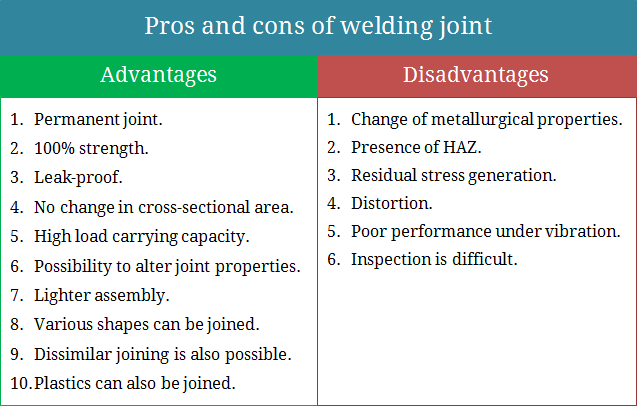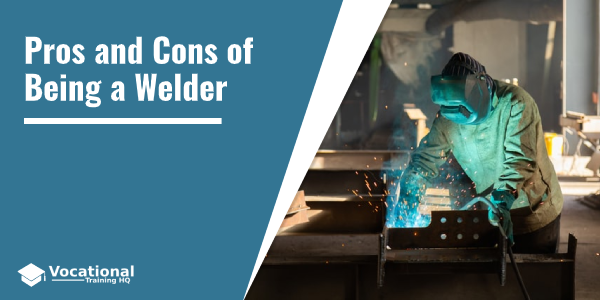Welding is a skilled trade with a mix of challenges and rewards. It’s a career that requires precision, patience, and a steady hand.
Many people consider welding as a career due to its demand in various industries. Welders work in construction, manufacturing, and even artistic fields. This job can be financially rewarding and offers job security. However, like any profession, welding has its downsides.
The work environment can be harsh, and safety is a constant concern. Understanding these pros and cons is crucial for anyone thinking about entering the welding field. This blog will explore the benefits and drawbacks of being a welder, helping you make an informed decision about this career path.

Credit: www.minaprem.com
Introduction To Welding
Welding is a skilled trade with a history of shaping industries. It involves joining materials, usually metals or thermoplastics, by heating them to the point of melting and fusing them together. This process creates strong bonds that can withstand immense pressure and stress. Whether building skyscrapers, ships, or intricate sculptures, welding plays a crucial role in construction and manufacturing.
What Is Welding?
Welding joins materials by melting them. The welder applies heat to the materials until they melt. Then, the materials fuse together, forming a strong bond. Various techniques exist, such as arc welding, MIG welding, and TIG welding. Each technique has its unique applications and benefits. Welders must choose the right method based on the materials and project requirements.
History Of Welding
Welding has ancient roots. Early forms date back to the Bronze Age. Blacksmiths used rudimentary welding techniques to forge tools and weapons. The craft evolved significantly during the Industrial Revolution. The need for stronger, more reliable joints spurred innovation.
In the 20th century, welding technologies advanced rapidly. The development of arc welding and other modern techniques revolutionized the industry. Today, welding is integral to many sectors, including automotive, aerospace, and construction. Its history reflects human ingenuity and the drive to build stronger, more durable structures.

Credit: www.vocationaltraininghq.com
Skills Required
Being a welder is not just about joining metal pieces together. It requires a set of skills that go beyond the ability to handle a torch. Let’s dive into the essential skills needed to be a successful welder.
Technical Skills
Welding is a technical job. You need to know different welding techniques like MIG, TIG, and stick welding. Each method has its own set of rules and best practices.
- MIG Welding: Good for beginners, as it is easier to learn.
- TIG Welding: This is more advanced and offers precision.
- Stick Welding: Great for outdoor work, as it handles rough conditions well.
Besides techniques, understanding blueprints and welding symbols is crucial. Imagine trying to build something without knowing what the plan looks like. That’s why reading blueprints is a must. Welders also need to know about metal properties. Different metals react differently to heat and pressure, so this knowledge helps in making strong, durable welds.
Physical Stamina
Welding can be physically demanding. You often work in awkward positions—standing, crouching, or even lying down. It’s not just a job; it’s a workout! You need good hand-eye coordination to make precise welds. And let’s not forget about the heat. Welders work in hot environments, sometimes for long hours. This requires stamina and endurance.
| Physical Demand | Why It’s Important |
|---|---|
| Hand-eye Coordination | For precise and accurate welds. |
| Endurance | To withstand long hours in challenging positions. |
| Heat Resistance | Working in high temperatures for extended periods. |
Think of it as being an athlete. Just like sports, welding demands physical fitness. So, if you’re considering this career, be prepared to stay in shape.
Advantages Of Being A Welder
Welding can be a fantastic career choice for many reasons. It’s not just about joining pieces of metal together; it’s about creating something strong and enduring. Whether you’re considering a career change or are just starting out, understanding the advantages of being a welder can help you make an informed decision. So, let’s dive into some of the benefits that come with this trade.
High Demand
One of the biggest perks of being a welder is the high demand for skilled workers in this field. The construction and manufacturing industries always need welders. In fact, according to the U.S. Bureau of Labor Statistics, the employment of welders is projected to grow steadily.
Why is this important? High demand means job stability. You won’t have to worry too much about job security. Plus, there’s always a chance to pick up extra work if you want to.
Good Salary
Let’s talk money. Welding can offer a good salary. The pay varies depending on the industry, location, and experience level, but generally, welders can make a decent living.
Here’s a quick breakdown:
| Level | Approx. Annual Salary |
|---|---|
| Entry-level | $30,000 – $40,000 |
| Mid-level | $40,000 – $50,000 |
| Experienced | $50,000 – $70,000+ |
With experience, specialized skills, and certifications, you can earn even more. Some welders, especially those working in more challenging environments like underwater welding or on oil rigs, can earn six-figure salaries. Imagine that!
So, if you enjoy working with your hands and creating something tangible, welding could be a rewarding path for you. The high demand and good salary are just two of the many reasons why this profession could be a great fit.
Job Security
When considering a career as a welder, job security is an important factor. Job security means you have a steady job and a regular income. In welding, job security can be strong, but there are pros and cons. Let’s dive into some key points under the following headings.
Stable Career
Welding can offer a stable career. Once you learn welding skills, you can find jobs in many places. Factories, construction sites, and shipyards need welders. This means you can work in different locations and industries. Plus, skilled welders are always in demand. So, if you are good at your job, you can have work for many years.
Imagine this: John, a welder for 20 years, has worked on everything from bridges to boats. He says, “I never had to worry about finding work. There is always something to weld!” This shows how welding can be a stable career.
Industry Growth
The welding industry is growing. As technology advances, new welding techniques and tools are developed. This means more job opportunities for welders. For example, the renewable energy sector needs welders for building wind turbines and solar panels. These industries are expanding, so welders are needed more than ever.
According to the Bureau of Labor Statistics, welding jobs are expected to grow by 3% from 2019 to 2029. That might not sound like much, but it means thousands of new jobs. So, if you are a welder, you can expect more opportunities in the future.
But remember, every job has its ups and downs. While welding offers job security, it can also have challenges. In the next sections, we will explore more pros and cons of being a welder.
Opportunities For Advancement
Becoming a welder can open up a world of opportunities for those willing to put in the hard work. While the job might seem straightforward, the career path in welding is anything but flat. There are numerous avenues for advancement, each offering its own unique set of benefits and challenges. Let’s dive into some of these opportunities and see how they can shape a welder’s career.
Career Progression
One of the most exciting aspects of welding is the potential for career progression. When you start as a welder, you might be working on basic tasks, but with experience and additional training, your responsibilities can grow significantly. Here are some stages in the welding career ladder:
- Entry-Level Welder: At this stage, you’re getting your feet wet, learning the ropes, and mastering the basics.
- Experienced Welder: With more time under your belt, you start taking on more complex projects and honing your skills.
- Lead Welder: Often a supervisory role where you guide and mentor newer welders, ensuring quality and efficiency.
- Welding Inspector: A step up from hands-on welding, focusing on quality control and compliance with safety standards.
- Welding Engineer: Involves designing and planning welding projects, requiring advanced knowledge and problem-solving skills.
As you can see, the path from an entry-level welder to a welding engineer is both challenging and rewarding. The key is continuous learning and seizing opportunities as they come.
Specialization Options
Another fantastic aspect of a welding career is the ability to specialize. Specialization can lead to higher pay, increased job security, and more interesting work. Here are a few popular specializations in welding:
| Specialization | Description |
|---|---|
| Underwater Welding | Combines diving with welding, often for repairing ships and underwater structures. It’s high-risk but highly rewarding. |
| Pipe Welding | Focuses on welding pipes, typically in industries like oil and gas. Requires precision and skill due to the complexity of the work. |
| Aerospace Welding | Works on aircraft and spacecraft components. Demands high accuracy and adherence to strict industry standards. |
| Fabrication Welding | Involves constructing metal structures and parts. Often found in manufacturing and construction industries. |
Each of these specializations requires specific skills and certifications, but they also open doors to new and exciting career opportunities. Whether you’re welding underwater or in the aerospace industry, there’s never a dull moment.

Credit: www.youtube.com
Challenges Faced By Welders
Welding offers great rewards but also comes with its own set of challenges. Welders face unique difficulties, both physically and mentally. This profession requires precision, skill, and endurance. Let’s explore some common challenges welders encounter.
Physical Risks
Welders often face physical risks. Burns are common, as welding involves high temperatures. Exposure to ultraviolet light can harm the eyes, leading to “welder’s flash.” Long-term exposure to fumes can affect lung health. Repetitive motions may cause joint and muscle pain. These physical risks demand strict safety measures.
Work Environment
The work environment for welders varies. Some work in factories, others outdoors. Extreme temperatures, loud noise, and cramped spaces are common. This can be uncomfortable and even dangerous. Proper gear and safety protocols are crucial. Welders must stay alert and focused to avoid accidents.
Work-life Balance
Being a welder has its unique challenges and rewards. One significant aspect is the work-life balance. Welders often face demanding schedules and varying job locations. This can impact their personal time and family life.
Long Hours
Welders frequently work long hours. Some projects have tight deadlines requiring extended shifts. This can lead to fatigue and less personal time. Weekends and holidays may also be workdays. This can further strain the balance between work and home life.
Travel Requirements
Many welding jobs require travel. Welders may need to move frequently for different projects. This constant travel can disrupt personal routines and family time. It can also make it hard to maintain a stable home environment.
Despite these challenges, many welders find satisfaction in their work. The skills and experiences gained can be rewarding. Balancing work and personal life requires effort and planning.
Frequently Asked Questions
What Are The Disadvantages Of Being A Welder?
Welding has disadvantages like exposure to harmful fumes, risk of burns, noise, and long hours in uncomfortable positions.
Is Being A Welder Hard On Your Body?
Yes, welding can be physically demanding. Welders may experience strain on their back, neck, and knees. Prolonged exposure to fumes and high temperatures can also affect health. Proper safety measures and ergonomic practices can help reduce these risks.
Why Do Welders Not Live Long?
Welders often face exposure to hazardous fumes, intense UV radiation, and physical strain. These factors can lead to health issues, reducing life expectancy. Proper safety measures can help mitigate these risks.
Can You Make $100,000 As A Welder?
Yes, you can make $100,000 as a welder. Specialized skills, certifications, and working in high-demand areas increase earning potential.
Conclusion
Being a welder comes with its own set of pros and cons. The job offers good pay and high demand in many areas. It also allows you to work with your hands and see immediate results. On the flip side, it can be physically demanding and may pose safety risks.
Weigh these factors carefully. Decide if welding matches your career goals and lifestyle. This choice is yours to make.

